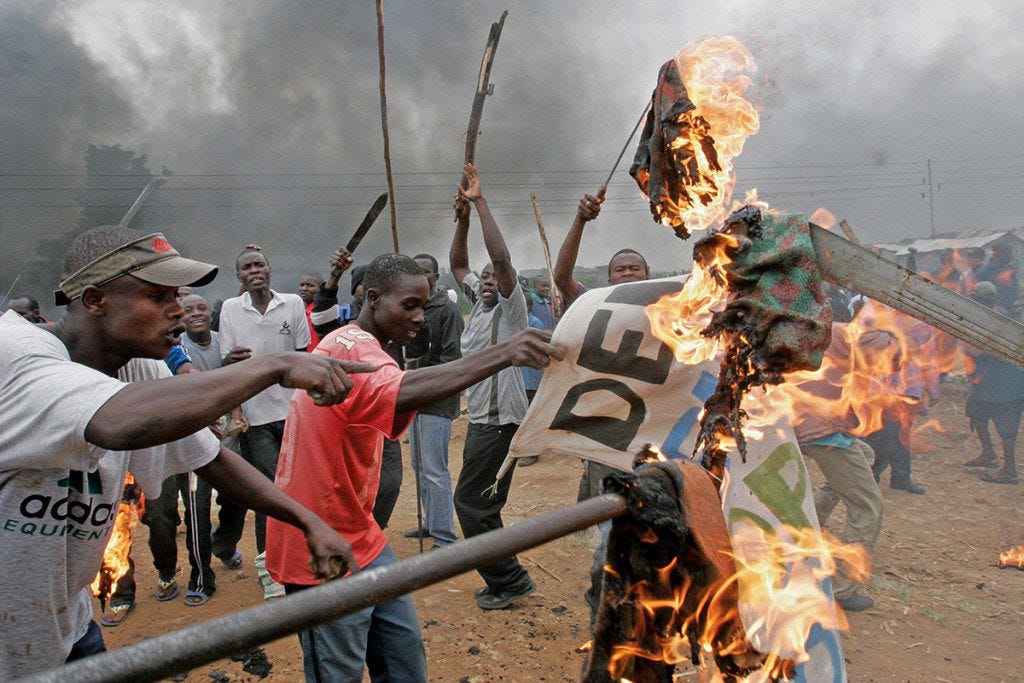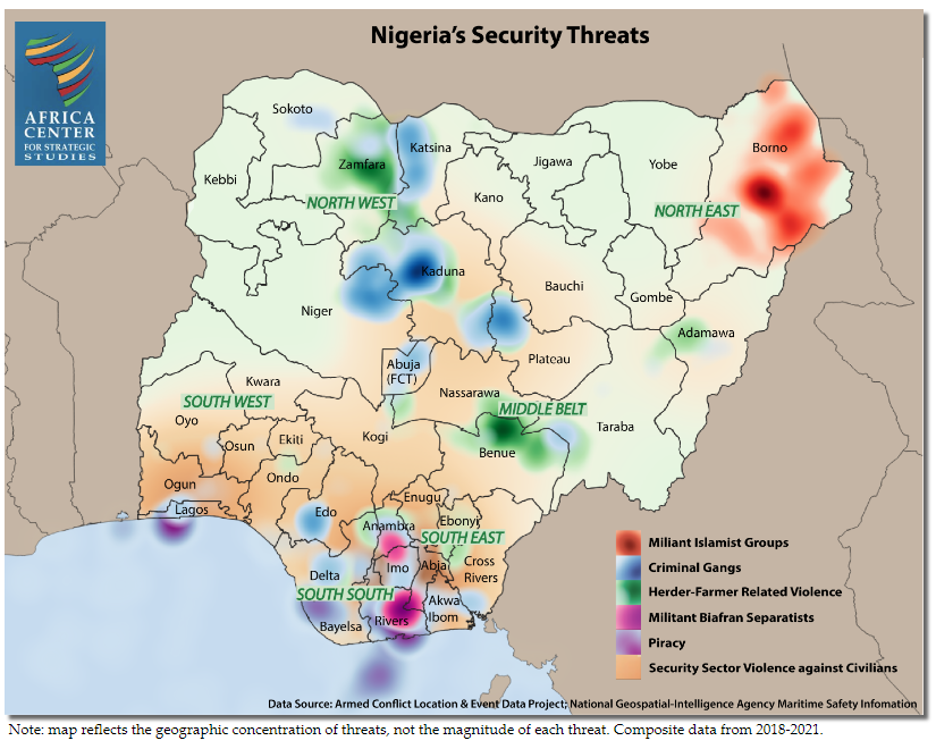Nigeria Slips Into Lawlessness amid an Eroding Security Situation
All is not well in Africa's most populous country and fourth-largest economy and the consequences of this could be global moving forward.
Nigerian protestors following the widely contested results of the 2023 general election. Image source
On April 17, a large group of armed assailants attacked a village in northern Nigeria's Kaduna state, killing at least 23 people and taking an unknown number of hostages. The identity of the assailants, whom local media have described as terrorists and bandits, also remains unknown. Kaduna state is just one of several regions across Africa's most populous country to experience a flare-up of violence and insecurity over the past decade.
The worsening security situation in Nigeria comes amid a severe economic crisis and growing disillusionment with the state and its most important institutions. With a population of over 218 million people, Nigeria's continued breakdown of order could produce severe regional and global consequences.
Surging Violence
Violence is surging across Nigeria, with 9,000 people killed in violent incidents in 2023. Last year also saw the kidnapping of 3,600 people – a record high. Although the government made ransom payments illegal last year to dissuade kidnappings, this has largely not worked, and there are rumors that even the government has paid ransoms in some cases. According to a Nigerian think-tank, more than 100 gangs with a combined membership of over 30,000 currently operate in northwest Nigeria alone. Not all kidnappings are financially or criminally motivated, as terrorists also conduct mass kidnappings. In the 2010s, Boko Haram rose to infamy for kidnapping hundreds of school children in a single incident, forcing many into marriages. Nigeria now ranks eighth in the Global Terrorism Index's top ten countries most affected by terrorism.
Nigeria's illicit groups tend to vary by region. In the country's northwest, the two most prominent terror groups include Boko Haram and a group that reportedly splintered off from it, the Islamic State West Africa Province. These groups remain locked in a brutal conflict with one another and victimize the public with mass murder, kidnappings, and general criminal activity. Meanwhile, in the southeast, a separatist movement borne from longstanding ethnic tensions continues to remain a major security threat. In the central parts of the country, longstanding religious and ethnic tensions between mainly Christian farmers and Muslim herders are also a significant source of violence. In the Niger Delta, Militias and bandits are responsible for sabotaging or damaging oil infrastructure and engaging in coastal piracy, resulting in a non-conducive environment for business. Violent cult militias are also prevalent in much of the country's south. These groups continue to gain power as the country's political, economic, and security situation continues to deteriorate.
Governance Failings
Public disillusionment is widespread in Africa's largest democracy, with voter turnout in last year's general elections falling to a record low of 27%. President Bola Tinubu came to power with just 36.6% of total votes in what observers variously described as a flawed or rigged election with widespread allegations of inconsistencies. Since 1999, two parties have dominated Nigeria's elections: the All Progressives Congress (APC), which has been in power since 2015, and the People's Democratic Party (PDP) – both are widely seen as corrupt and out of touch. Although APC President Tinubu campaigned on the promise of improving security, violence across the country continues to escalate. Nigerians broadly lack confidence in many crucial state institutions. In 2022, two-thirds of surveyed Nigerians said they lack confidence in their country's judicial system, and 88% said they view it as corrupt.
Nigeria's ongoing inflation crisis hinders efforts to improve its security situation. Although the government recently increased military spending, inflation caused it actually to fall in real terms. Furthermore, entrenched corruption and politics hinder the military's effectiveness and capacity. Individual members of the security forces have been embroiled in controversy over alleged rights violations, extrajudicial killings, disappearances, arbitrary arrests, and more. According to some estimates, the military's campaigns against the Boko Haram terrorist group have led to the disappearance of some 25,000 people. Last December, a drone strike by the army killed 85 civilians observing a Muslim festival in Kaduna. Public trust in the security forces is low due to these and other perceived incidents of excessive force and corruption. Although authorities are now considering creating new local police forces to address rising insecurity, this public mistrust will ensure law enforcement will face significant challenges maintaining order moving forward.
Protest against alleged rigging in last year's elections. Image Source.
A Worsening Economic Situation
An ongoing currency and cost of living crisis underpins Nigeria's current spiral into violence. In 2022, Nigeria was Africa's largest economy but slipped into fourth place just two years later, mainly due to falling oil production and exports. Once Africa's largest oil exporter, Nigeria's oil production has fallen by 50% since 2005 due to rising instability that has contributed to increased costs both on and offshore.
Industry leaders, including Shell, Chevron, ExxonMobil, and others, now question the viability of Nigeria's once-celebrated oil industry, with each seeking to divest or scale down their on-shore assets and operations in the insurgency-plagued Niger Delta. In 2022, Shell Nigeria stated that insecurity and theft posed an "existential threat" to Nigeria's industry, where oil theft, vandalism, and violence create a highly hostile environment for foreign businesses. According to the Nigerian National Petroleum Corporation (NNPC), Nigerian authorities shut down 6,465 illegal refineries in the past two years and recorded over 9,000 infractions in the past year alone.
Last year, Nigeria's new President, Bola Tinubu, removed fuel subsidies and floated the currency to bolster the country's deep-seated macroeconomic issues. However, these measures had the primary impact of causing rampant inflation, which reached 33.2% last March, a 28-year high. Moreover, the Nigerian naira (the country's currency) fell to an all-time low against the U.S. dollar in February. Although a reduced currency valuation can bolster exports, Nigeria's manufacturing sector – which accounts for some 10% of its gross domestic product (GDP) – remains weak due to its inability to keep up with record inflation.
Most importantly, food inflation has risen by 35% since the beginning of 2024, and reports of grain warehouse lootings are widespread. In February, a stampede killed seven people when authorities began auctioning rice seized from smugglers. According to the International Monetary Fund (IMF), almost 1 in 10 Nigerians now face hunger, and even more are vulnerable to food insecurity. Moreover, food cultivation is reportedly harder due to widespread violence in the countryside, and the sudden elimination of fuel subsidies has caused fuel prices to increase by over 200% since January. Although Nigeria's economy is projected to grow marginally in 2024, this is primarily underpinned by growth in the service sector, especially financial services. However, increased lawlessness and desperation across the country pose a significant risk to the country's long-term stability.
These significant challenges come amid Nigeria's attempts to position itself as a reliable energy supplier to Europe following the collapse in Russian exports. Russia's 2022 invasion of Ukraine revived calls to complete the proposed $13 billion Trans-Saharan gas pipeline, which would transport some 30 billion cubic meters of Nigerian gas to Europe via Niger and Algeria upon completion. However, a lack of available funding in Nigeria combined with regional tensions following last year's coup in Niger pose a substantial threat to the project's viability. Although Nigeria now seeks to move forward with an alternative route through Morocco, security and governance issues remain a significant obstacle.
Conclusion
Nigeria is not alone in its growing instability. The broader West African region is dealing with a wave of coups, along with increased terrorism and insecurity. This regional instability threatens to further deteriorate Nigeria's security as cross-border crime becomes increasingly prevalent in the region. With no end in sight for the country's inflationary crisis and other economic woes and widespread disillusionment with the state and its institutions, Nigeria continues to hurdle toward chaos. This erosion of order could produce severe ramifications regionally and globally moving forward.










When the State allowed Tinubu to be seated as President it was all over, he did not for example win Lagos State, a constitutional prerequisite for wining the election , but their Supreme Court ignored it and, well, here we are...
Good read. Thank you.